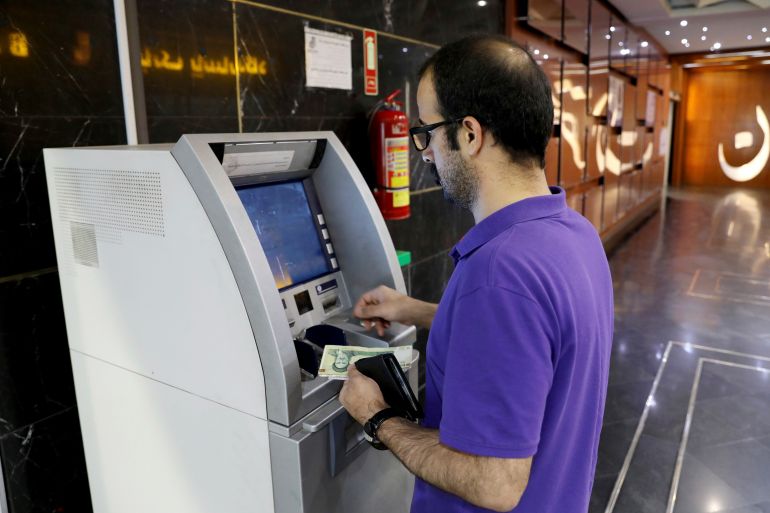Iran’s currency hits new record low amid nuclear deal uncertainty
Iran’s response to the falling currency has been a typical mix of pumping cash and cracking down on speculators.

Tehran, Iran – Iran’s national currency has hit new all-time lows amid developments that have cast doubts about the complete restoration of the nuclear deal and lifting of the United States sanctions.
The rial has fallen to historic lows against the US dollar in recent days, trading at rates close to 330,000 in the open market on Saturday and Sunday, the first two days of the working week in Iran.
Keep reading
list of 3 itemsDrones sign of strong Iran-Tajik relations as Tehran looks east
IAEA warns of ‘fatal blow’ to nuclear deal as Iran cuts cameras
These are the embattled currency’s lowest rates since October 2020, when it had fallen past the 320,000 mark following the imposition of new sanctions by the US that signalled the effective severing of the entire Iranian banking sector from the global financial system.
The rial’s new freefall comes after a resolution censuring Iran’s nuclear programme introduced by the US and its European allies was passed by the board of the International Atomic Energy Agency (IAEA) earlier this week.
In response, Iran began taking off several cameras installed by the global nuclear watchdog in the wake of the resolution.
Rafael Grossi, the IAEA director, said Iran will remove 27 cameras and has also begun installing cascades of new centrifuges, in a development that he said if not addressed quickly, could signal a “fatal blow” to efforts to restore Iran’s 2015 nuclear deal with world powers.
In a phone call with the United Nations Secretary-General Antonio Guterres on Saturday, Iran’s Foreign Minister Hossein Amirabdollahian called the resolution “political and hasty”. Earlier this week, Iran’s President Ebrahim Raisi had said the country will not back down in face of pressure.
There has been no sign this week to indicate that Iran and the US will restart their indirect negotiations aimed at restoring the Joint Comprehensive Plan of Action (JCPOA) which have stalled since March following disagreements over sanctions relief.
The landmark deal put curbs on Iran’s nuclear programme in exchange for sanctions relief, but since the US walked out of the deal, Tehran has boosted its nuclear activity.
Iranian media reported on Saturday that an “extraordinary” meeting of the Expediency Council, attended by senior political and military officials, has been held in which security chief Ali Shamkhani has provided a report about the latest state of the nuclear deal talks that began in April 2021.
Since unilaterally abandoning the landmark accord in 2018, the US started imposing waves of punishing sanctions that among other things battered the Iranian currency, which traded below 40,000 to the greenback prior to the sanctions.
‘Highest cash levels in history’
The Iranian government and central bank’s response to the latest weakening of the national currency has been a typical mix of pumping cash and cracking down on speculators.
According to the semi-official Tasnim news website, a group of foreign exchange traders was hosted by the central bank on Sunday to coordinate efforts to strengthen the rial.
Ali Salehabadi, the central bank governor, said exporters have been directed to offer their banknotes in the market to bring down foreign currency rates. He also repeated his claim earlier this month that the central bank’s foreign currency reserves are at their “highest levels in history” without mentioning any specific figures.
According to the central bank, it has cashed in $7.5bn worth of proceeds from sales of crude oil, derivatives, gas condensate and petrochemical products in the initial two months of the current Iranian calendar year ending on May 21 despite the sanctions.
Earlier this month, the heads of the three branches of the state – the government, parliament and the judiciary – granted the central bank new “special powers” to control the market that were not named.
They also outlawed futures contracts for both foreign currencies and gold as they believe speculators and foreign actors use these deals to breed pessimism about the national currency.
A branch of Iranian police focused on combating economic violations announced on Sunday that 31 operation leaders of organised futures deals were arrested. The force has declared future deals “illegal” as they purportedly create “fake demand” for foreign currencies.